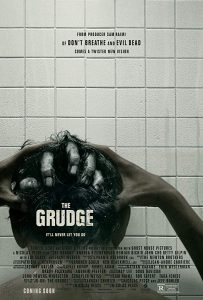OFTEN you have to stop from second guessing yourself in film criticism.
You come out of a film thinking ‘that was pretty good’ or ‘God, that was average’ and then see and hear reviews claiming it was completely the opposite.
My latest example is 2019’s The Grudge, the fourth instalment in the American version of this film series.
Contrary, it seems, to a lot of critics and viewers, I enjoyed the film a great deal and consider it well-shot, acted and constructed.
It doesn’t necessarily progress the over-arching story, which began with the original Japanese film Ju-On: The Grudge in 1982, but it does bring a different and welcome look and style to the series.
The 2004 American remake of Ju-On and its previous two sequels were standard cinematic fare. But writer/director Nicolas Pesce (Piercing 2018, The Eyes of My Mother 2016) has created something that is stylistically more like a high-end television series.
Gone these days is the criticism of films having a ‘televisual’ (i.e. budget) style, with the line between the quality of film and television now significantly blurred.
If you’re familiar with this series you’ll be interested to know it was originally just going to be a reboot of the 2004 American remake but has ended up being a so-called ‘sidequel’ that takes place during and after the events of the 2004 film and its sequels.
Regardless of this, the new film can also stand on its own. Like the original films, the story unfolds in a non-chronological manner across several locations and characters that occasionally intersect.
For those who don’t know the basis of the film is in Japanese legend, and perhaps belief in some quarters, that grief can become all-consuming. In the first film a family suffered a tragedy and grief took over their home, also bringing death to other family members and anyone who came into contact with the location.
In the films the malevolent force is physically manifested in a long-haired female ghost/demon.
The new film starts with a live-in nurse fleeing a house in Tokyo, disturbed by the events she has witnessed inside. But the curse follows and possesses her and, after arriving back in Pennsylvania, she murders her husband and daughter and then commits suicide.
The inter-connecting story-lines and characters then play out over the next two years, all in some way involving the inhabitants and visitors to the Pennsylvania home, including police detectives investigating different murders at different times.
There is a nice tone and pace to the majority of the film, particularly during the first half, and the majority of horror is of the disturbing rather than jump-scare driven variety.
It’s elevated by the strong cast which includes Andrea Riseborough, Demián Bichir, John Cho, Betty Gilpin, William Sadler and Jacki Weaver, all of whom have moments in which they shine.
Without giving anything away, the ending is particularly effective and in keeping with the interesting approach that director Pesce brings to the material.
This is a stand-out horror film that unfortunately is being penalised for being a January release, the period of time when critics think many films are just time fillers.
